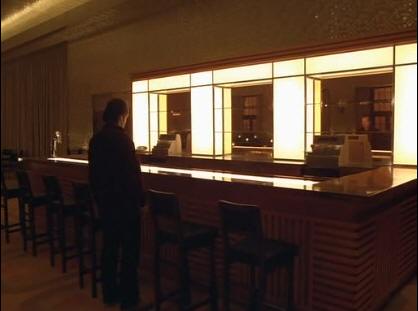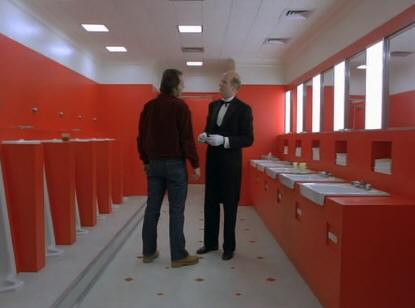CHAPTER NINE
As detailed in the previous chapter, there are dozens of subliminal connections between the room 237 sequence and the fatherly love scene. Room 237 is basically a dream logic version of the Torrance apartment and the neck injuries inflicted upon Danny for having woken his father up. One of the biggest giveaway’s that Jack strangled Danny is a shot in which Jack walks down a mustard coloured hallway before switching on the lights of the Gold Room. In the previous scene he was accused by his wife of choking the boy and in this scene his reaction to the presence of mirrors confirms her accusation. There are a series of four mirrors on the wall to our left. As Jack passes each mirror he reveals his guilt with violent gestures. In particular, as he passes the second mirror he shakes his fist in the air as if strangling a toddler.
And while passing the third mirror he tries to swipe his own reflection from his field of vision.
Jack is trying to suppress his feelings of guilt. In chapter five we explored the use of mirrors in terms of their cross symbology with doors, but here we find that they serve to reflect Jack’s thoughts. This also happens in several other scenes – in fact it happens in every one of Jack’s encounters with the ghosts of the Overlook. After passing the four mirrors outside the Gold Room, Jack sits at the bar and again is unable to escape his reflection due to mirrors behind the bar.
So he covers his eyes and offers his soul for a drink.
When he opens his eyes again the mirrors are cluttered with bottles of alcohol and his refection has been replaced by Lloyd, the barman.
The weird conversation that follows is basically a visual metaphor of Jack speaking to himself. They’re both wearing maroon coloured jackets and have a similar cheeky smirk. Once Jack gets into the swing of his dialogue the camera stays on him and we see nothing of the barman. Just a couple of scenes later Jack encounters the woman in room 237 and again he sees the apparition in a mirror.
So aside from the room 237 scene being a dream sequence, it also maintains the paradigm of apparitions as symbolic reflections of living characters. Later Jack returns to the Gold Room and, after a brief chat with Lloyd, has a discussion with Delbert Grady in the lavatory. Yet again the apparition, to whom Jack speaks, is standing in front of a mirror. The angle at which we see the close ups of Grady feature a background mirror that should be refelcting Jack, but Jack is absent - perhaps a continuity error or perhaps another hint that Grady is merely Jack's reflection.
And the symmetrical compositions of the wider shots enhance the mirror concept.
In the wide shot in which Jack is facing the camera his eyes even appear to be looking over Grady’s shoulder and at himself in the mirror.
Details of the conversation also support the notion of Jack externalizing his inner demons as hallucinated ghosts. Jack, “Mr Grady, you were the caretaker here.” Grady, “I’m sorry to differ with you sir, but you are the caretaker. You’ve always been the caretaker. I should know sir. I’ve always been here.” The repeated presence of mirrors during Jack’s ghost conversations has been noted by film critics, but the one exception seems to be when Jack talks to Grady through the door of the storeroom. The unlocking of the storeroom from the outside is generally accepted as the final indicator that the hotel is in fact haunted and the ghosts real. However, there are details that conflict with this. The mirror concept is present here, but in a slightly different form to the other scenes. The inside of the storeroom door is a flat steel surface that gives a blurred reflection – in other words it’s a symbolic mirror and Jack is again talking to himself.
If you take a look at the door from which Halloran and Wendy exited the freezer room from, you’ll find that both sides of this door have the same grooved pattern as the outside of the storeroom.
Only the inside of the storeroom door has the flat polished design because it is a symbolic mirror for the purposes of the hidden narrative. So if all of these conversations with ghosts are basically manifestations of Jack being insane then is there even a supernatural presence in the hotel at all? Time and again, ghostly visions reveal themselves under scrutiny to be dream sequences, reflections or hallucinations. But again, what about the physical unlocking of the storeroom from outside? Jack couldn’t hallucinate this into reality. There is at least one rational alternative to explain Jack’s release, but I’ll save that subject for a later chapter. For now I’ll ask you to bare with me and work with the premise that Jack is insane and all his ghostly encounters are merely reflections or hallucinations. His strangling of Danny at the Overlook is not an isolated incident. When Danny is seen by a psychiatrist at the start of the film, Wendy explains that her husband dislocated Danny’s shoulder in a drunken rage for scattering his work papers across the floor. She explains that Jack had then told her he was never going to touch another drop of alcohol and that he’d kept his word and not had a drink in “five months”. This five month timescale is important because just over a month passes during their stay at the Overlook before Jack goes insane – so this would mean he’d been off the booze for roughly six or seven months. However, his conversation with Lloyd (himself) in the Gold Room conflicts with this timing. He tells Lloyd, “Here’s to five miserable months on the wagon … and all the irreparable harm it’s caused me.” The missing month could justifiably be written off as a logistical error in the script, but then a much more exaggerated mismatch of timing occurs. Jack, “I did hurt him once ok. It was an accident … completely unintentional. Could’ve happen to anybody … AND IT WAS THREE GODDAMN YEARS AGO!!!” This huge mismatch of time is very difficult to pass off as a script error. Combine this with the revelation that it was Jack who strangled Danny in the Overlook and a simple truth is revealed … Jack Torrance was and still is a violently abusive father. No wonder little Danny was afraid to go to the hotel and had nightmares about what was coming. Danny, “Dad … You would never hurt Mommy or me would you?” The prospect of spending an entire winter alone with his parents is a recipe for an escalation of Jack’s abuse. The argument between Jack and Wendy about Danny’s injuries is a typical parental argument, in which one partner is abusive of the child. Jack, “I think he did it to himself. … Once you rule out his version of what happened there is no other explanation is there? … It wouldn’t be that different to the episode he had before we came up here.” He then storms out of the apartment, giving a resentful glance at Danny’s bedroom and slamming the door on his way out. Jack’s own self-assurance in the Gold Room mirror sounds like the standard self-deception of a compulsively violent father, “I wouldn’t touch one hair on his goddamn little head. I love the little son of a bitch. I’d do anything for him … Any fuckin’ thing for him.” Jack also seems to dislike the intrusion of Doctor’s into the family’s affairs, “When do you think maybe he should be taken to a Doctor. … You believe his health may be at stake. … And you are concerned about him. .. And are you concerned about me?” Wendy is the typical weak-minded partner who allows her husband to abuse her own child. During her conversation with the psychiatrist her hand trembles as she lights her cigarette, as if she is scared the doctor may find out some terrible family secret. And her explanation of Jack dislocating Danny’s shoulder is obviously an attempt to play down Jack’s level of violence and responsibility. Her willingness to believe Danny’s absurd story of a crazy woman hiding in room 237 is also a convenient escape into denial. Danny’s psychological problems are a form of disassociation from his abuse traumas. He pushes the painful parts of his experience into unconsciousness by creating an imaginary friend who carries those experiences for him at the unconscious level. When he senses a new threat from his father, the anticipation manifests itself through conversations with his finger or through nightmares or through symbolic visions that cause him to lose consciousness. Wendy’s confession to the psychiatrist that Danny’s “episodes” began when he was put into nursery school suggests that the violent abuse began around that time. And Jack’s description of himself as “formerly a school teacher”, hints at a history of violent behaviour toward other children, which was also true in the book. Some of these dysfunctional family indicators can hardly be described as subliminal. They’re quite overt, even in the surface narrative, and have led some reviewers to perceive the film as being primarily a study of family breakdown in modern America. This may be the case, as later chapters will reveal that Kubrick had several other controversial things to say about America. An interesting aspect of all this is the role of alcohol. The liquor that appears at the bar in the Gold Room is certainly imaginary. There was no liquor in the room when Jack walked in. Ullman also told the Torrance’s while showing them the Gold Room that it is hotel policy to “always remove all the booze from the premises” during the winter break to lessen the insurance costs. The only other way Jack could have gotten a real drink would have been for him to sneak his own supplies to the hotel. this is another mystery that will be explored as part of other themes in a later chapter. An interesting visual connection is that when Jack takes his first sip of a drink in the Gold Room his face suddenly takes on a gaunt look with his eyes rolled slightly into his upper eyelids. This is virtually the same expression his frozen corpse has at the end of the film and even the shot size and angle are identical.
Kubrick is showing us that Jack was never spiritually possessed in the first place. He was simply a violent drunk. His staggered rambling in the maze would certainly pass for intoxication.
In fact most of his increasingly erratic behaviour during the film can be seen as that of a violent drunk.
|















